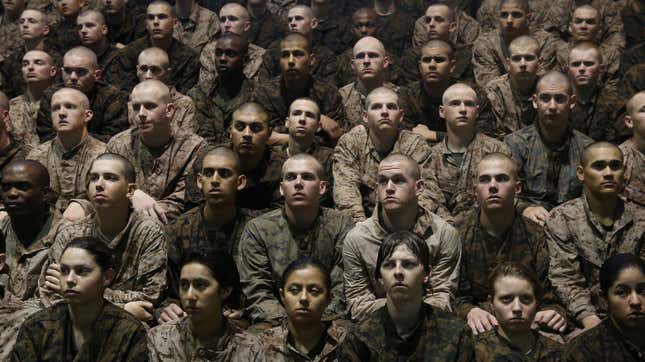More Men Are Speaking Up About Being Sexually Assaulted in the Military
Latest

The issue of sexual assault in the military is now widely acknowledged, and high-ranking military officials have started, due to sustained public pressure, to belatedly (if imperfectly) address it. And while the focus has largely been on the servicewomen who have been sexually assaulted, a new report from the New York Times is a reminder that sexual violence while serving in the armed forces affects large numbers of men as well. And more men in the military who have been raped and assaulted are speaking up.
According to Pentagon statistics quoted by the Times, 10,000 men—largely young and thus with less institutional power and more vulnerable to abuse—are sexually assaulted in the military every year. And while women are seven times more likely to be sexually assaulted while in the military, due to the much higher numbers of men in the armed forces, a roughly equal number of men as women are assaulted annually.
More, from the Times:
For generations, the military wasn’t looking for male sexual assault victims, so it failed to see them, according to Nathan W. Galbreath, deputy director of the Defense Department’s Sexual Assault Prevention and Response Office. Only in 2006, after the office began surveying service members, he said, did the military learn that at least as many men as women were being assaulted.
“That was surprising to senior leadership,” Mr. Galbreath said. “Everyone was so sure the problem was a women’s issue.”
A report published in May indicates that while the share of male victims who come forward has been rising recently, an estimated four out of five still do not report the attack.
Whether one believes Galbreath that men being sexually assaulted was a surprise to high-ranking officials (I personally do not), it’s clear from the men interviewed by the Times that men being sexually assaulted and raped while in the military is an issue that has been longstanding—and one that military leaders have strenuously attempted to ignore.
Take the case of Jack Williams, who was 18 when in 1966, he was raped while at an Air Force bootcamp by his drill sergeant. “If you report this, no one will believe you,” Williams remembered the sergeant telling him. When he graduated from boot camp, he filed a report. “No investigator ever called me,” he told the Times. “Nothing was ever done.”
Here’s what did happen:
Instead, his chain of command began to complain about his performance, he said, because the rapes had left him with damaged kidneys and a torn rectum, and because he was missing too much training in order to get treatment. He was soon forced out of the Air Force for being medically unfit, his service record shows.
For Ethan Hanson, who was sexually assaulted by a drill instructor while showering during Marine bootcamp in 2014, he and others reported the incident to higher-ranking officials, and the drill instructor was “prosecuted,” according to the Times. Hanson, however, was shortly pushed out of the Marines:
Mr. Hanson graduated from basic training and tried to move on, but soon afterward he saw a Marine dressed like the drill instructor, and had a panic attack.
He told his superiors that he was suicidal, and was sent to a Navy hospital. But when his mental health did not improve after four weeks, the Marine Corps forced him out of the service, noting on his discharge papers that it was for “failure to adapt to military life.”
“It’s their way of saying, it’s my fault, not theirs,” Hanson said to the Times. “If I was injured in training, they would have to treat me and compensate me. But they said this was a pre-existing condition.”
Most men, as the Times notes, do not report incidents of sexual assault, though the number who do has been growing in recent years, and they are demanding both treatment and compensation from the Department of Veterans Affairs. According to the Times, 61,000 veterans are now “formally recognized by the department as having been sexually traumatized during their service, and the number of claims filed each year has surged by 70 percent since 2010.” Still, for the men who have been assaulted, the effects have lingered. “I had a future, I wanted to serve my country, and I was good at what I did,” Williams told the Times. “That was all taken away from me.”